I've nearly finished my book! Although the book is about "education and information", it's really about a way of looking at everything that's going at the moment in education. It's clearly a very bad time in education where there is a disconnect between the managerial messiahs (some of them simply bad people!) running our institutions, exhausted teaching staff, and alienated students whose increasing debt pays for it all. The question is how to get analytical purchase on it all.
There are a few concepts which provide analytical purchase as indices into social activities. For example, the study of the concept of ‘capital’ provides insight into the social processes of exchange that constitute most of economics. “Information” is a similar concept to capital: it provides aspects which are measurable, whilst inviting the kind of deeper ontological investigation and critique that Marx and others conducted on capital. Technological development has contributed to the measurement, investigation and awareness of information becoming an object of public consciousness through the revelations of Wikileaks and Edward Snowden and concerns over the uneven relationship between information and polity. Yet the social activities upon which the concept of information (and its related concepts of "knowledge" and "meaning") has the strongest bearing are those of education. So my book is about exploring this relationship in the context of Higher Education and the society that constitutes it.
This is a stab at an introduction...
Introduction
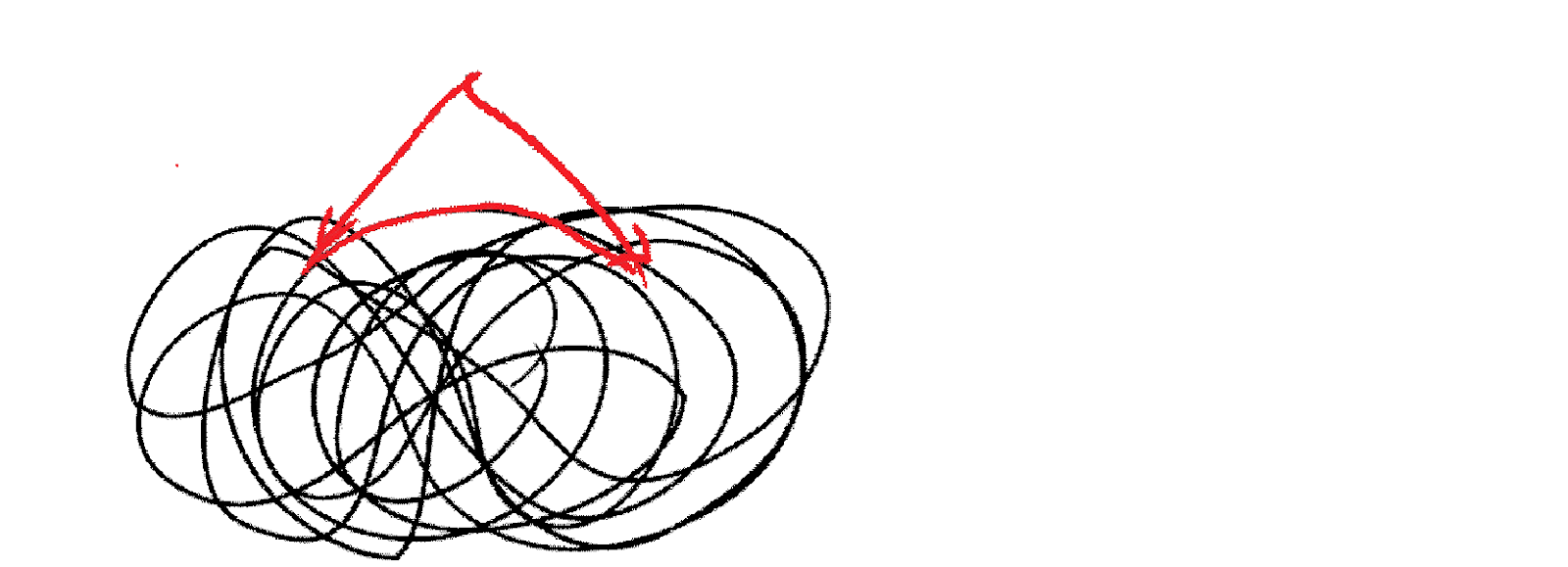
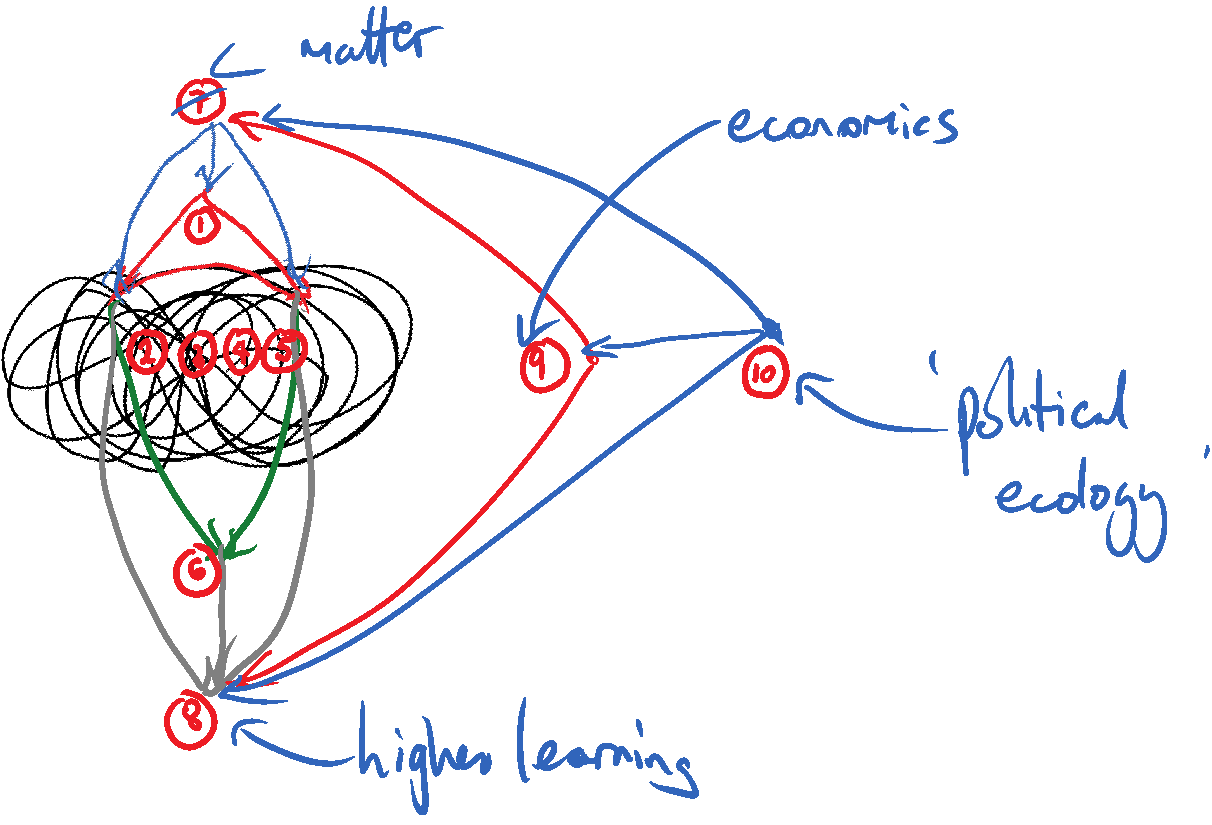
There are a few concepts which provide analytical purchase as indices into social activities. For example, the study of the concept of ‘capital’ provides insight into the social processes of exchange that constitute most of economics. “Information” is a similar concept to capital: it provides aspects which are measurable, whilst inviting the kind of deeper ontological investigation and critique that Marx and others conducted on capital. Technological development has contributed to the measurement, investigation and awareness of information becoming an object of public consciousness through the revelations of Wikileaks and Edward Snowden and concerns over the uneven relationship between information and polity. Yet the social activities upon which the concept of information (and its related concepts of "knowledge" and "meaning") has the strongest bearing are those of education. So my book is about exploring this relationship in the context of Higher Education and the society that constitutes it.
This is a stab at an introduction...
Introduction
The book has three central aims. The first is to attempt to answer the question “Why is higher education confusing?” Politicians and some educational managers are seldom allowed to admit education to be confusing: education ministers can only present confidence in their mastery of education issues of the day with half an eye on what they can get away with saying as they seek to progress to their next ministerial appointment; managers wish to avoid the pitfalls of the quality audit! Yet education is confusing. I present no attempt to explain education. But I do attempt to explain why educational thought is tangled and how it is that even the most closely argued attempts to explain it cannot escape the tangle. My attempt (I hope) can at least suggest approaches to the task of untangling some of it.
The second aim concerns dealing with what might be seen as a culprit for education becoming more confusing in the last 15 years or so: the explosion of computer technology. After centuries of relative stability in its practices produced by institutional cloistering, computer technology (particularly the Web) began to dismantle the cloister. The bare human dimensions of the educational institution became exposed providing opportunities to academics who examined technology’s relation to the University to experiment and think about what was happening. I was one of these people, and benefited from the curious academic career of an ‘e-learning specialist’, funded by government projects to explore the potential of technology in education. This period, lasting just over 10 years, produced plenty of opportunities (and some lucrative academic positions) for gurus and “champions” of “E-learning” who argued that education would be transformed, learners liberated, and inequality of opportunity defeated by access to information. There has been a transformation, but the idealism of the gurus has been proved to be empty. Other changes have been profound – most notably the rise of technocratic management of institutions on the back of the apparent flexibility that technology affords. Technology has brought a dramatic shift in the organisation of institutions, and in the ways decisions are made within them, the way educational managers regard the purpose of education, fundamentally brought about through a shift in the relationship between information and decision. Consequently there has been a transformation in the relationship between education and society, learning and economy, status, politics and wealth.
The third aim is to present the study of information in its relation to education as the scientific focus of a research programme into modern higher education. Education’s relationship to information has been debated as long as practices of education have fluctuated between those which are mechanical and (by implication) universal from those which are human and particular. Simplistic views of information regard it as fundamentally mechanical, such as in the satirical presentations of the “Nuremberg Funnel”. Yet the contemporary debate about information is much richer, reflecting the fact that despite its ubiquitous usage, the word information is used in to refer to many different things: not only information in statistics, graphs and textbooks, but information in DNA, information and truth, information in physics (particularly the debate over information in the universe), right through to information in theology (God as information). Where is the coherence in this concept? As more than one academic of information science has articulated, there is no coherent theory. In presenting the question of information at the heart of education, I both argue that a coherent theory of information cannot exist without a theory of education, whilst the study of information presents a path of research into producing a coherent theory of education.
My ultimate focus is on information’s relationship to human organisation, ethics and social emancipation. The way educational institutions are organised, the way decisions are taken within them, the way their relationship to society is determined by government, the way economies work, and the way individuals learn and develop are not separable concerns. The education/information issue runs through the whole piece. At a time when educational institutions are becoming increasingly managerial, the costs of education rising, scholarship threatened, the gap between rich and poor growing at ever more vertiginous rates, and the individual debt burden of education rising with it, something appears to be out-of-balance in society: something is wrong in our political ecology. My conclusions points towards the relationship between information and decision-making and the need for the monitoring of political ecology in the same way that we have become increasingly aware of our environmental ecology. In fact, the two issues of politics and environment are related: care of the planet and care of citizens are both dependent on effective decision-making in the light of information. Issues of learning and education are inevitably tied up with this.
Untying the knots
The book begins in the middle of the ‘tangle’ of education and gradually works outwards. There is sense that education always begins ‘in the middle’: whether we are subject to it or we are writing about it, there is an ‘origin’ of which we are only vaguely aware (but tell stories about); and there is a ‘future’ of which we dream. In writing this book, I can look behind me to my childhood and my own education. I, like everybody else, deeply mattered to other people in the past (parents, teachers and friends). They worried about my development in ways similar to the way we worry about the development of the future generation. Like all commentators on education, my concern is for the development of the next generation (just as our parents worried about our generation), the unfolding political crisis (is it really that different from the various crises that obsessed our parents but of which we were only vaguely aware?). The ‘topic’ of education is a network of concern.
Middles are generally confusing, complex and tangled. In the university, curricula, teaching methods, timetables, technologies, bureaucracy, quality assurance, assessments, certificates, discourses, journals, rankings, citations and knowledge are all in the mix. What’s it all about? How much of it actually matters? Once again, this is contested, although the rise of ‘marketisation’ of universities has brought new orthodoxies which have become almost universal in the sector internationally: the acquisition by graduates of a ‘good’ job is hailed as the underlying objective of university education, and the benefiting from a ‘graduate premium’ in lifelong salary. However, the argument is thin: some kids without qualifications don’t get good jobs; but equally some kids with qualifications don’t get good jobs either (and have hefty student loans to pay-off). The marketization orthodoxy has obscured older reasons for the importance of Universities: their role in exploring the ‘hidden options’ of a society; their role in maintaining knowledge; their role in upholding a society’s hopes that the world might become a better place; their role in upholding the principle of free thinking and speech.
Inspection of institutional practice reveals a dominance of bureaucracy. This is as old as the institutions themselves. Today we have the setting of learning outcomes, the conduct of examination boards, quality assurance, student appeals, through to the approval of new courses, funding of initiatives and the careers of ambitious (and somewhat overpaid) Vice-Chancellors and senior managers. What matters about all of this? If the universities disappeared tomorrow, what would the world be like? The defenders of Universities would worry about the absence of higher learning and the preservation of knowledge seen as vital to civil society. But ask them to define Higher Learning, and once more we find a contested domain. Universities offer courses in medicine, philosophy, music, computer games, special effects, business, law, engineering, chemistry, physics and parapsychology. Do they all represent ‘higher learning’? If so, what is the common denominator? If not, which ones do, which ones don’t, and what’s the difference? Add to this the fact that whatever higher learning is present, it is wrapped in the bureaucracy, learning outcomes, assessment boards, certificates and graduation ceremonies of the institution to such a point that it is hard to separate the experience of having ones’ mind expanded (or not) with the mind-shrinking procedures and hurdles that have to be negotiated. It seems that “learning” and “education” are not the same, although they are frequently (and possibly deliberately) confused. The confusion manifests in the paraphernalia of education masquerading as an indicator of higher learning: ticked learning outcomes, quality inspections, student surveys and assessment boards are manifestations of education indicating that ‘learning’ is proceeding according to the bureaucratic scheme. Alienated students and disaffected staff may well say something different were they not afraid to speak out for fear of jeopardising their hard-won qualification or losing their jobs.
I want to spell this out to shed some light on how my book proceeds to unpick this complexity. I need to use a metaphor to explain this, so I begin with a tangled knot of thread. When I think about education, this is how it feels: I follow trains of thought which develop and cross others, and eventually find it difficult to remind myself where I started. I have met no educational thinker who does not suffer this fate at some level. When dealing with a knotted tangle, the first task is to understand the causes for the strands being tangled: each section of the strand might represent different aspects of thinking, activities, material artefacts, institutional structures and so on. They appear to interweave with each other causing knots: 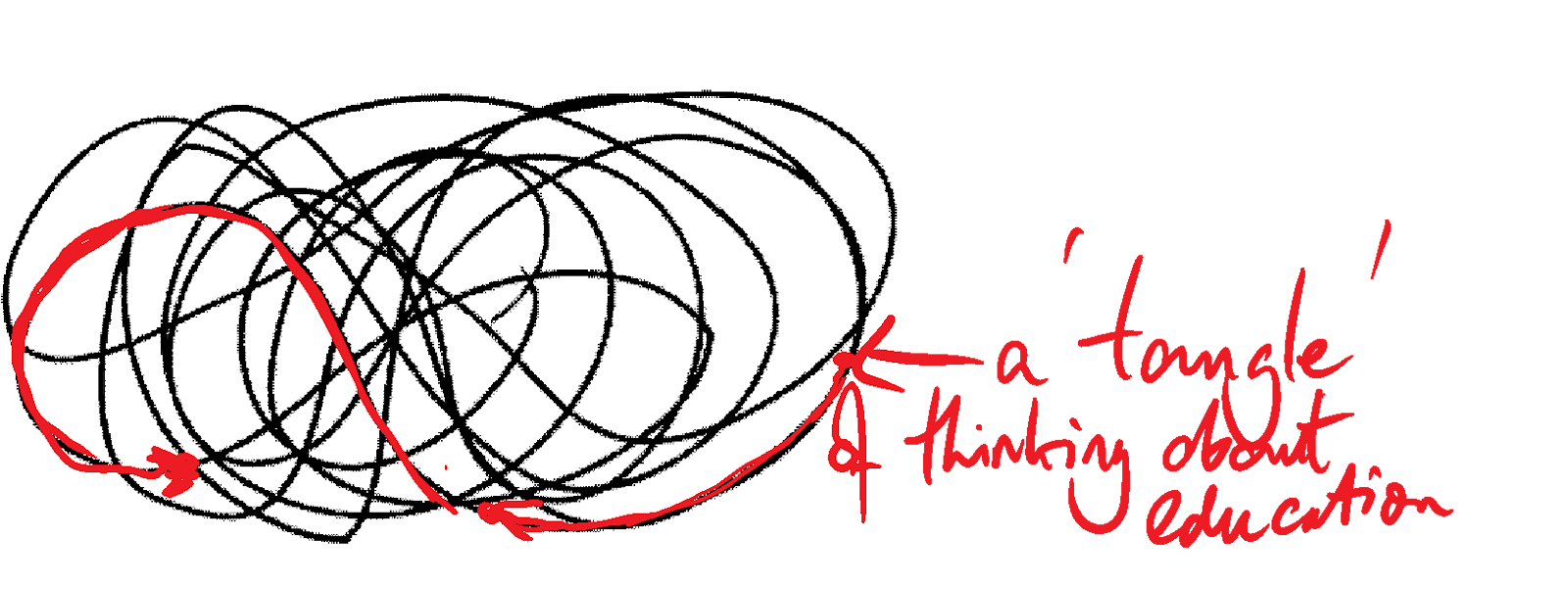
It is possible to trace the line in its passage from left to right and back again. From one point on the line to another there is some kind of transformation that takes place. Let’s say that each line passing from left to right or from right to left represents a transformation in thought: as if one might be thinking about the distinction between “Education” and “Learning” at the beginning, and end up thinking about the role of government at the other end. By the time we have reached the “role of government”, the strand is bending back on itself and is now transforming into a question about how (and whether) higher learning matters in society.
My approach is to analyse the transitions along the thread, identifying the points at which one way of thinking transforms into another and in so doing produces the knots which create confusion. In order to do this, one has to have a meta-perspective of the ways of thinking about education. My intention is that greater consciousness about the ways in which educational thought proceeds, so there is greater awareness of where one way of thinking turns into another. So in the diagram below, I show my meta-perspective examining the transition between two points on the thread. Such a perspective might be considered to be a ‘synoptic’ view of the transition:
But what is a ‘way of thinking’? At a most basic political level in the distinction between ‘left’ and ‘right’ there appear distinct approaches to thinking about the world which reflect in the dispositions and arguments presented by people. Philosophers, whilst also politically divided, have divided themselves into different camps for centuries: followers of ‘idealists’ like Descartes, Hume, Kant and Hegel situate themselves in opposition to ‘realists’ like Plato, Aquinas or Marx. Sometimes these distinctions became tied to national identities: German idealism, British empiricism, and so on. In the 20th century, discourse divides between the ango-american ‘analytical’ philosphy, which privileged logic and mathematics building on the work of Frege, Wittgenstein, Quine and others, whilst ‘continental’ philosophy draws from the tradition of phenomenology and existentialism focusing on consciousness represented by in work of Husserl, Heidegger, Sartre. Some schools of thought have not only been national, but institutionally-focused: the Frankfurt school of critical theory, with the leading figures of Adorno, Habermas, Horkheimer, and others building on the work of Marx. Whilst labels are convenient attenuators of the nuances of positions, there are real distinctions in ways of thinking.
In recent years, a kind of meta-philosophy has attempted to bridge the gap between different ways of thinking. Meta-philosophical attempts usually take the form of one way of thinking embracing the qualities and nuances of other ways of thinking. For example, in Bhaskar’s Critical Realism analytical approaches and phenomenological approaches are marshalled under the guise of a fundamentally Marxist and critical orientation. In Chapter 2, I consider this approach in detail, partly because it represents an attempt to think about social reality which is at once illustrative of the critical perspective, whilst also being practically useful in terms of its methodological implications. At the root of Chapter 2, I argue that ethics underpin ontological thinking about education: that to know the essential nature of something is to know what is right. Critical thinking concerns the nature of the material basis of education and the causal connections that are attributed to people who engage with it. This introduces conflicts in ontological position: basically – what do you think the world is like? However, there is a point that this kind of thinking breaks down since it leaves out the experiential nature of learning.
A similar attempt to bridge the gap between different perspectives, and one which is almost diametrically opposed to Bhaskar’s is that proposed by Alain Badiou and a small group of contemporary philosophers called ‘Speculative Realists’. Badiou, like Bhaskar, believes that the gap between different ways of thinking entails deep ontological critical thinking. However, his ontology is different, and this leads him to see coherence oriented in the rational apprehension of mathematical structures. This is an approach deeply connected to the phenomenological inquiry of Husserl, himself a mathematician, as it attempts to draw out distinctions between conscious existence and the events which surround it. I address the concerns of the phenomenological path in Chapter 3.
Beyond the philosophical characterisation of different ways of thinking, I have been influenced by Burrell and Morgan’s seminal contribution to Management Studies in their “Sociological Paradigms and Organisational Analysis”. My book follows a similar scheme to Burrell and Morgan, although my orientation is specifically on education I can only recommend the reader to consult their work for a more detailed and comprehensive coverage of different ways of thinking than I aim to present here. My excuse for my own lack of comprehensive coverage is that whilst Burrell and Morgan’s purpose was to sketch out their ‘paradigms’ of thought (four of them) typically used in organisational analysis, they were at least facing a discourse which has roughly oriented itself towards different paradigms. The education discourse does not. Instead the education discourse exhibits a kind of paradigm schizophrenia where is continually changes in orientation (hence the tangles). It is the schizophrenic dynamics which concern me here.
In Burrell and Morgan’s work the ‘functionalist’ paradigm receives far more attention because it has dominated management and organisational thinking. Similarly, it has dominated thinking in education – and particularly within the application of technology to education. I devote two chapters to functionalism. These chapters reflect the ideals of those who have attempted to solve deep educational problems through interventions of technology and systems. Cybernetics, the branch of knowledge concerned with systemic organisation, dominates this thinking. Chapter 4 deals with the cybernetic thinking that underpinned the development of learning technologies, learning theories, theories of social organisation and theories of institutional management. Whilst cybernetic thinking is seen to be out of fashion, the analysis of information is very much in vogue. Chapter 5 deals specifically with a subset of this: the theory of information. This latter domain occupies central importance today as computer technologies has harnessed vast amounts of information rendering powerful ‘intelligent’ behaviours which we increasingly depend on a regular basis, from increasingly sophisticated search algorithms, data mining, automatic translation, voice recognition all the way through to the possibility of mind reading. Many ‘positive’ logical explanations of education have been aired. These tend to talk of mechanisms of learning of one sort or another. Negative logic examines the context and focuses on the possibility of new kinds of analysis which help to bridge the gap between experience, politics and technology. Each new exciting development carries with it ethical concerns about privacy, power, liberty and identity with governments and technology corporations vying with each other in a battle between innovation and social control.
Thus my synoptic view of the passage of thinking from one moment to the next is a consideration of the ways in which one way of thinking changes into the next. The broad conflicts and struggles between different ways of thinking are outlined in Chapter 1 and this frames Part 1 of the book.
Part 2 draws out strands from the middle. Whilst individual learners and teachers are caught in a tangle of different motivations and forces pulling them in different directions, there is nevertheless a rationale behind the educational decisions that are taken. For each individual in education there is some goal that is rationally defended which acts as a point of focus for people moving through the crazy bureaucracy of education. This focusing forwards is not a limit of origin (as we had in Chapter 1’s synoptic view of transitions), but a limit of perceived destination or goal. The rational justification for entering education is as limiting as the shifts in understanding that cause thinking to be tangled. This, as Heidegger noted, is v a condition of thought. Chapter 6 questions what it is to think rationally about education at all. Questioning the role of rationality in educational thinking entails a consideration of the rationalism that underpins the thinking of learners entering education, their hopes for the future and the ways in which they believe education will help them achieve their dreams, and the hopes for a hopes for a rational account of the way educational thinking becomes tangled are well-founded. Beginning with the different conceptions of rational decision-making, I explore the extent to which the available models of rational action account for educational actions and behaviours. The central question concerns the role of emotion in rational behaviour and the role of emotion in learning. Deep down, I argue that this question concerns the nature of those things which people become most passionate about: their values. Can a rational account for values be produced? Can values be explained? Chapter 6 ends with a consideration of the relationship between values, explanations and the social conditions for the agreement about causes. What kind of social context is required for discussion and agreement to take place? In particular, what is the role of information in the process of establishing an agreement? And what do agreements tell us about information? The question of rationality gradually opens up a question about the social institutions whose purpose is the exploration of values: universities. In delimiting rationality, Chapter 6 looks a bit like: 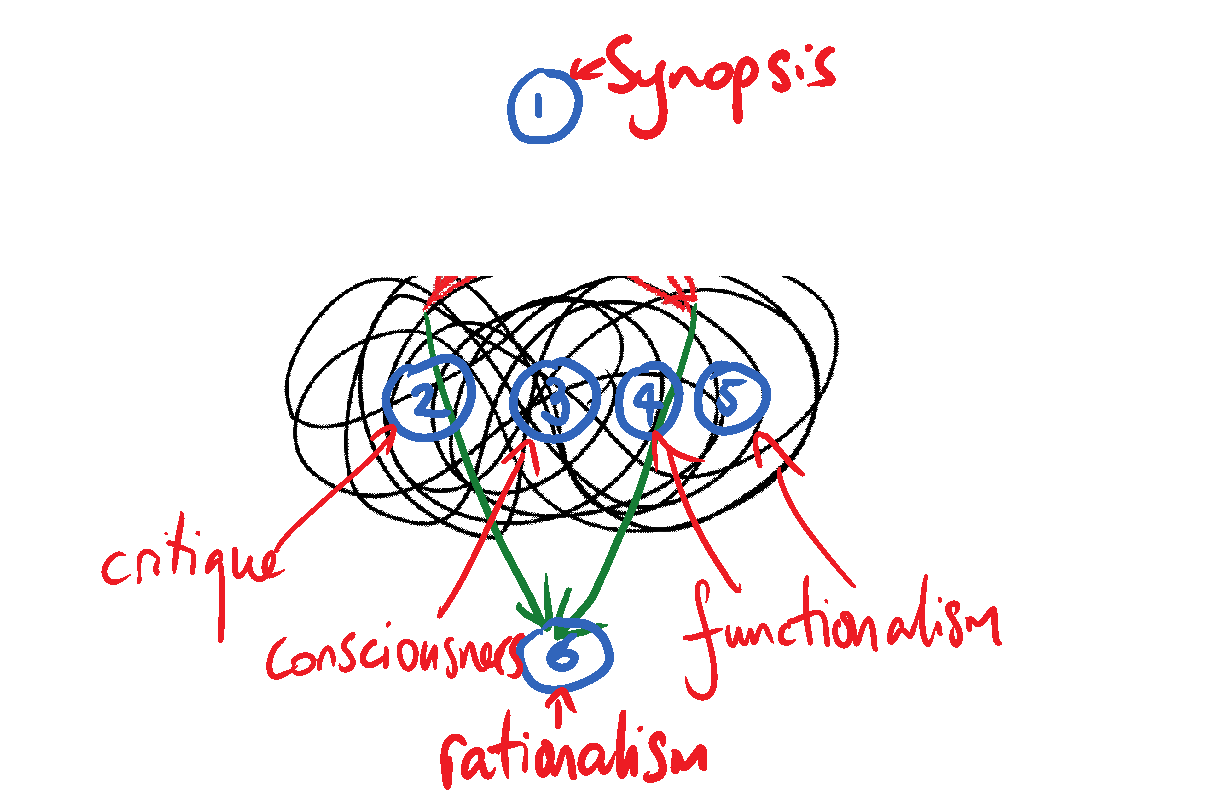
n Chapter 7 deals with the material origins of different ways of thinking. Thus, the materiality of Chapter 7 may be seen as a limiting factor on Chapter 1: it is a limit on the way that different ways of thinking might be perceived. Information is conveyed through physical artefacts and through these artefacts and their information, humans coordinate themselves through making decisions. Most of what is characterised as “educational development” manifests itself in material form in some way: new technologies, textbooks, schemes of work, policies, and so on. New objects within the education system are the stimulus for attempts to interpret them, ascribe meanings, and coordinate expectations. In Chapter 7 the issue of the materiality of information, the institution and the learning environment is addressed. Central to this concern for material things is a more hidden dimension: that of the implicit evolutionary dynamics of material. Not only are textbooks, webpages, maps and lecture theatres material and causal in the education process, but with regard to improving that process, so those material artefacts are imagined to ‘evolve’ so as to produce an enhanced material environment (and presumably ‘better’ learning). Chapter 7 considers materiality in the context of this implicit evolutionary mindset. What processes are called upon to ‘improve’ practice or resources or technologies? How do the evolutionary dynamics relate to the broader social dynamics and power relations in education?
With materiality at its origin, and rationality and values driving the focus of educational activity, there remains a central unasked question: why is it that we are driven to acquire knowledge? Without the inner drive of individuals to push the frontiers of knowledge, it is unlikely that universities would exist. Moreover, whatever rational plans of action one might have, there is a deeper drive for truth and knowledge, and the University has been the place within which to pursue this. Chapter 8 asks what is ‘Higher learning’? This, I argue, is a question which underpins the pursuit of rational inquiry: it acts as a limit on the concepts of rationality articulated in Chapter 6. I begin with the variety of definitions of higher learning that have appeared over the years. All of these tend to delimit the question such that their responses are too narrow in focus in order to account for the richness of practice that goes on in the University. In particular, few definitions of Higher Learning would acknowledge any kind of practice in new universities which widen participation to University learning as ‘higher learning’: definitions tend to be elitist. Building on the arguments of Chapter 6, I suggest that Higher Learning has something to do with values. Pursuing the arguments of Chapter 7, I argue that values relate in some way to the material conditions of existence. Returning to the themes of Part 1, I articulate an ecological and dialectical picture of Higher Learning as the interaction of ways of thought within a material and social context that is created to nurture the dialectic. In essence, this is to merge the structural and organisational aspects of Universities with the activities of learning which go on inside them. Furthermore, pursuing this analysis allows for some useful distinctions between higher learning and schooling, and the position of the university in relation to politics and socioeconomic life. With this positioning, a symmetry of the organisation of chapters in the book arises: 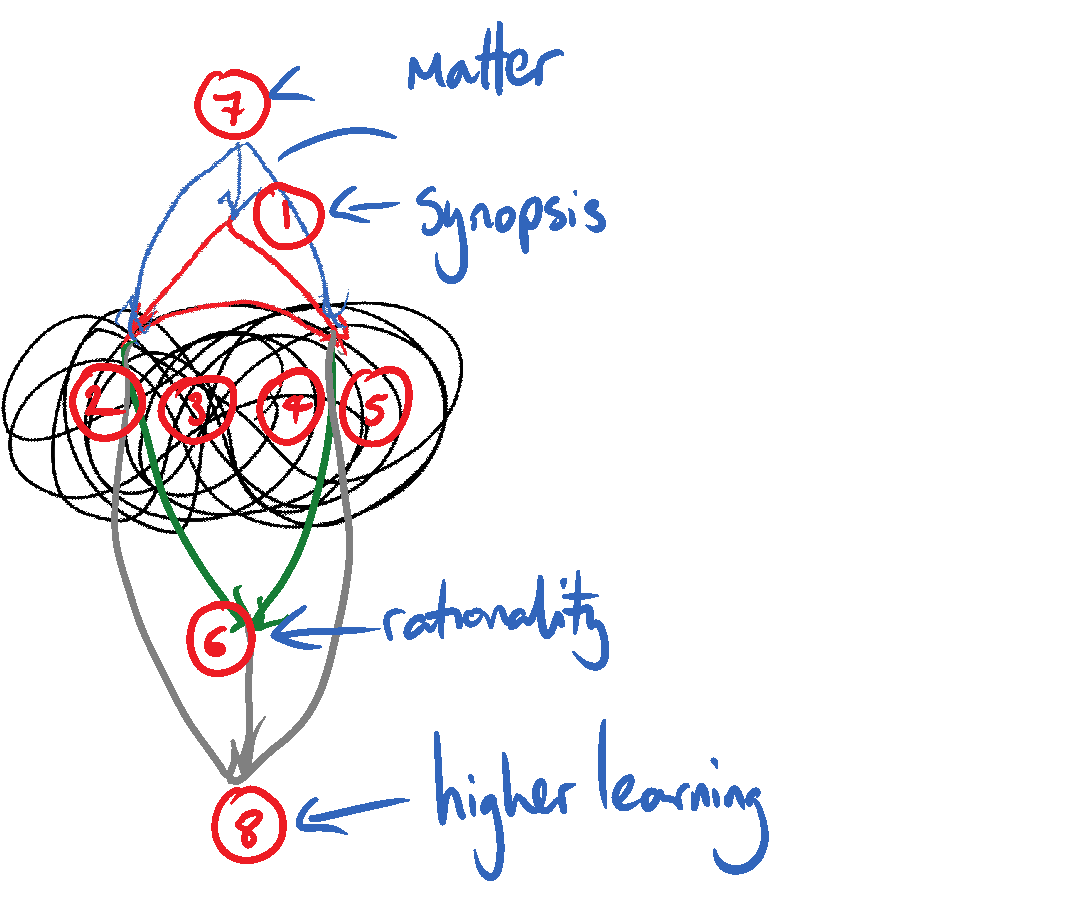 With this basic symmetry, there remains the task of considering the whole dynamics from material origins to rationality and the quest for knowledge. The fundamental question that emerges is one of human action, and that this concerns socio-economic behaviour. Starting with the economics of the Austrian school, since this branch of economics is most concerned with information and its relation to human action, Chapter 9 considers the nature of information as it is understood by this school, which entails a deeper consideration of learning. Consequently, the argument of Chapter 9, beginning with education and moving to economics, then moves back from economics towards education. Economic questions become questions about how to organise higher learning in society; how to engender individual and collective hope in society. Whilst the “education industry” appears now as a major industry in its own right, the questions this raises are fundamental concerning the role of political systems and the nature of educational provision. To what extent is the emerging debate about higher education a problem of economics? How does an economics oriented around information (as in the Austrian school, but also in the post-Keynesian work of Stiglitz) relate to processes of learning and education?
With this basic symmetry, there remains the task of considering the whole dynamics from material origins to rationality and the quest for knowledge. The fundamental question that emerges is one of human action, and that this concerns socio-economic behaviour. Starting with the economics of the Austrian school, since this branch of economics is most concerned with information and its relation to human action, Chapter 9 considers the nature of information as it is understood by this school, which entails a deeper consideration of learning. Consequently, the argument of Chapter 9, beginning with education and moving to economics, then moves back from economics towards education. Economic questions become questions about how to organise higher learning in society; how to engender individual and collective hope in society. Whilst the “education industry” appears now as a major industry in its own right, the questions this raises are fundamental concerning the role of political systems and the nature of educational provision. To what extent is the emerging debate about higher education a problem of economics? How does an economics oriented around information (as in the Austrian school, but also in the post-Keynesian work of Stiglitz) relate to processes of learning and education?
A socio-economic perspective is limited in practical life by the way that decisions are made and the ways that the big question “what do we want from education?” is asked. There have been many attempts in the past to polemicize education. Limiting the economic debate is a political debate. However, this is a political debate which is characterised by powerful polemic with little effect on policy. In Chapter 10, I consider why some of the most powerful contributers to this polemic have not seen their ideas have much effect beyond the confines of University education departments. Of particular interest is the work of Ivan Illich and Paulo Freire. Formal education, believed by Illich to be ‘unfeasible’ seems to be increasing its stranglehold on society. At the same time, the conception of education that Freire abhorred – the “banking” conception of knowledge – appears to be the dominant form of our understanding of learning, having enlisted the support of increased testing, competency criteria, international league tables and so on. Why has this happened? What was wrong with the critique that it merely won admirers without having any political bite?
Chapter 10 suggests an answer to this question lies in both Freire and Illich misunderstanding the importance and nature of information. As a result, no coherent research programme in education could be founded on their ideas which could hold in one grasp both the scientific understanding of teaching practice, a coherent understanding of institutional organization and management, and the role of government in education. Without a methodological focus for their arguments, Freire and Illich could both be sidelined by a managerial elite in charge of institutions and governments who could dictate a separation between learning and management, exploiting general confusion in educational thinking, to their own advantage of control over the education system. In Chapter 10, my suggestion is for a connection to be made between the scientific study of information dynamics to be applied to the political ecologies which characterise the education system. I argue that that the approach to educational management and governance needs to monitor its own political ecologies as a way of maintaining environments which nurture higher learning. With this message, which is of course somewhat provisory, the book completes its structure which now looks like:
Why Information?


At the heart of my intention is to present “Education and Information” as inseparable aspects on the study of ecologies of relationships. Possibly the greatest difficulty I have in this is that “Information” is a topic that will be largely unfamiliar to education researchers. Information, by whatever definition we might adhere to (and there are lots of them) concerns the stuff that exists between things: Information is relational. Whilst education research will tend to focus on aspects of competency development (for example, literacy or numeracy development), or policy, or curriculum, or employability, studies draw their data from individual experience, individual competence, test scores, responses to questionnaires, etc. Never is the question asked “What is an individual in education?”, or more precisely (to borrow Christian Smith’s book that I quote in Chapter 1) “What is a Person?” The difficulty of seeing individuals subject to education as entwined in deep causal mechanisms of matter and communication present methodological problems that the popular methodologies of education research (particularly varieties of interpretivism which are most common) are poorly equipped to unpick. More recent approaches to sociomateriality, whilst acknowledging the difficulties, appear to present little more than re-heated postmodernism which lacks any kind of analytical bite.
Information grants analytical purchase on relationships. However, application of mathematical information theory such as Shannon’s formulae or Bayesian conditional probability represent functionalist and one-dimensional perspectives focused on individual performance. These perspectives have recently come to represent a significant realm in the governance of education. Algorithms that pick over citation statistics, learner engagement, institutional ranking, or teacher performance have real effects on the decisions of research funding committees and institutional recruitment processes as well as being directly deployed in journal rankings, institutional esteem indicators, teacher performance data and other statistics. However, there remains a disconnect between what the equations report, the decisions that result from their application, the meaning behind specific information sets, and the deeper definition of ‘information’ and its relation to decision in the first place.
Information is a contested domain much in the same way as education. The word “information” gets used in many ways. For example, Shannon’s theory of information concerns the transmission of messages between machines over a medium, and provides a range of mathematical measures which have transformed the technological infrastructure we are surrounded by, from transmission and compression to cryptography. Information is used within economics as an indicator of the constraints within which economic decisions are made. Information is used in a negative way too: misinformation is regarded by Dretske and Floridi as not being information at all, where both argue that information has an in-built orientation towards truth. Information is often used to refer to the DNA molecule where the complex processes of epigenesis unfold, leading some commentators to distinguish ‘forming’ information from Shannon’s mathematical concept. Information is also used to refer to semiotic processes of communication between cells, and processes of meaning communication leading to a separate distinction of ‘semantic information’. Information is also taken as a fundamental building block of the universe. Typically characterised as ‘Information ontology’, some physicists talk of an “It from Bit” ontology in cosmology, where information supervenes on matter. This has also led to theological speculation about the relationship between information and “logos”, particularly in the light of the first sentence of St. John’s Gospel. There is no coherent theoy.
Attempts to build a theory of information flounder when its relational character is lost (which is always). More often than not, information theories emerge as theories of agency. My argument in this book is that in order to maintain the relationality of information, it needs to be considered in the context of activities which too are relational: thus he coincidence of “information” with “education”, since education is relational. Information brings with it the possibility of analytical purchase on educational processes. Mathematical characterisations of relationships in the calculation of mutual information, entropy and so on can provide new ways of exploring relations in the light of the practices in education. Clarity about the relational character and the techniques for measuring it is important: it is not uncommon to hear that educational processes are described as processes of ‘transferring information’. Diagrams of ”learning” typically involve lines and boxes, where the lines represent ‘flows’ of information. In one way or another, there is an outside which affects an inside. What is transferred exactly?
In typical everyday educational experience, we might talk of:
- Information transferred in facts and figures within textbooks
- Information transferred in body language of learners and teachers
- Information transferred in skilled performances in tests
- Information transferred in the protocols of educational institutions
- Information transferred in educational policy directives and audit of their compliance
The connection between information, communication and relationship is apparent in each case. With regard to analytical purchase relationships, there are the Shannon formulae which are, as I discuss in Chapter 5, fundamentally about ‘surprise’, and the Bayesian formulae which can be useful for adapting automatic communication systems to anticipate surprises. Surprise is an important concept because surprise often leads to human action: either a knee-jerk reaction which is largely instinctive, or a more considered approach. Analytical approaches tend to be only applied to a delimited set of cases within the education system, to the exclusion of other cases where they might be equally applicable. For example, ‘Learning Analytics’ involves the application of formulae to the performance data of learners, but where the information of the teacher-learner relationship is seen as separable from the information of the institution-teacher relationship, or the government-institution relationship. This doesn’t make sense: the proper investigation of information in education is necessarily holistic, embracing all levels of the system. Each information-analytic approach itself produces information, and this information then produces “surprises” at other levels of the system resulting in human action. In the production of information follow power relations, fear and potential for exploitation.
To say that the manifestations of education processes, care and concern, the transference of skilled-performances and the paraphernalia of the educational institution, its governance, policies, technologies of management and organisation are all characterised by information is to say that they are characterised by relationships where relationships result in decisions. Information acts as a constraint upon human decision, much in the same way as the material environment constrains action. This, however, is to regard information as something not in the foreground, but in the background. Information is the ‘dark matter’ of education.
Throughout this book, I argue for a negative view of information. I present an argument oriented towards education that is in agreement with Terry Deacon who has identifies information with ‘absence’. The cybernetic anthropologist Gregory Bateson got there first: in a correspondence with John Lilly about his Dolphin research, argued “What I have tried to do is to turn information theory upside down to make what the engineers call “redundancy” [coding syntax ] but I call “pattern” into the primary phenomenon”. I furthermore agree with the statistical ecologist Robert Ulanowicz that “In that sense, it can truly be said that the most important contribution that information theory makes to science is not information”
Think about it. However much time we are surprised by things in education, so much more is repetition and ritual. Whether it is rote-learning or Latin verbs, obsessive thoughts on difficult topics, assessment of the meaning of practices in action research, or the analysis of a game of cricket, the balance between repetition and surprise is necessarily asymmetrical. What appears true of mental processes is also true of institutional organisation. A recent attempt in my university to “streamline” examination boards (where decisions are made about student marks) was defended with the argument that “so much time academics have circular discussions and that this is a waste”. Yet it seems that circular repetitive discussion is the very essence of academia! Finally, at a higher level still, the ‘eternal return’ of educational ideas at a political level also demonstrates redundancy.
It is with this awareness of redundancy and information that I make the connection to ecology and politics. This is a departure from those information theorists who have been content to derive grandiose theories of information from core principals (I address these in Chapter 5), including Luciano Floridi and Terry Deacon. What concerns me here is the connection between information, meaning and mattering.
Information might be best thought of as an ontological path of inquiry. To ask fundamental questions about information is to ask fundamental questions about the way the world is.
A Note about the Genesis of this Book
In discussions with Oleg Liber, who introduced me to some of the central cybernetic ideas presented in this book, my original intention was to call this book “Educational Cybernetics”. At one point, cybernetic thinking, although considered ‘old fashioned’ and much misunderstood (“is that about robots?”) and generally unknown in the academic community appeared to me to be a powerful “bite out of the tree of knowledge” as Gregory Bateson claimed. Bateson’s work, in particular, has indeed remained powerful for me. But today, the only cybernetic thinker to really have had a coherent impact on the social sciences is Niklass Luhmann: a fact which some cyberneticians find distressing, although there is much to recommend in Luhmann’s work. Even Bateson, who’s aphorisms are quoted everywhere, failed to make a concerted inroad into any social science discipline: perhaps only Family Therapy can claim a distinct Batesonian inheritance; even in anthropology (Bateson always considered himself an anthropologist) his work tends to form a background to Margaret Mead’s.
Over the years, I have had a love-hate relationship with cybernetics. Cybernetics always seemed slightly facile to me, its descriptions of the world seeming to side-step the major controversies of philosophy. However, I admired the breadth of the cybernetic ambition: the fundamental drive towards a coherent and defensible holism – providing one is sensitive enough to avoid the risks of evangelism or fundamentalism! I found a deeper (for which, you might read “more difficult” – which is not always the same as ‘better’) philosophical alternative to cybernetics in Roy Bhaskar’s Critical Realism which similarly emphasised mechanisms, was critical of cybernetic's constructivism, but which had similar grandiose claims on the nature of the world. For an academic, being caught between geniuses who advocate apparently similar but discordant positions is a constructive place to be. In trying to identify where I stood between these discourses, a third element emerged in my thinking which effectively articulated a critical view of both positions. This arose from a combination of engaging with the alternative description of reality presented by Alain Badiou, which threw the certainties of the Critical Realists (and their dogmatism) into doubt, together which the acknowledgement of broader critical view of organization, management and information represented through the Information Systems community and the Critical Management Studies community.
The result is that the book is now called “Education and Information”, not “Educational cybernetics”, and with the specifically cybernetic content restricted to Chapters 4, 5 and 10. I think this is a better title, but I have one or two regrets about not saying more about “Educational Cybernetics”, since my work in educational technology has taken place within an “Institute for Educational Cybernetics” at the University of Bolton. First of all, I want to be clear that Cybernetics, wonderful though it is, is not only functionalist, but typifies a blindness to the political implications of its ideas which compromises its attempts to be critical about itself and its adherents. These are deficiencies which were evident to critical theorists from the early inception of the discipline (see for example, Erich Fromm and Max Horkheimer). However, and this isn't simply to split hairs, “Educational Cybernetics” is NOT cybernetics. Educational Cybernetics is fundamentally about human relations because education is about human relations: those are by their nature political relationships made up of real people. More to the point, it seems obvious to me that education is an art of steering relationships. The metaphor at the root of cybernetics is “steering” (Kybernetes = the Steersman).
So I abandoned the title “Educational Cybernetics” for reasons of clarity for the majority of readers. I will still defend “Educational Cybernetics” as being the deep topic at the root of the critical study of “Information and Education”.
No comments:
Post a Comment